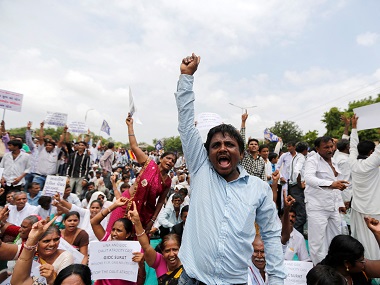Over two lakh Dalits participated in a rally on 16 October in Beed district of Maharashtra, demanding a tougher Scheduled Castes and Tribes (Prevention of Atrocities) Act. The rally led by a young kid, and followed by girls, women, senior citizens and youngsters, concluded with the group handing over a representation to the district collector. Strict punishment to the accused who brutally raped and murdered a 13-year-old Maratha girl on 13 July 2016 in Kopardi village of Ahmednagar district was one of the other demands.
This was the first time Dalits had taken to the street, almost more than two months after members of the Maratha community and other upper castes started organising rallies at various cities across the state. Since 9 August, the first Maratha rally in Aurangabad, Marathas have held over 40 rallies with each rally witnessing more than three to five lakh participants.
But why now? According to political pundits, the answer to the question isn’t as clear as perceived.
An analogy of demands
The Maratha rallies began with a demand of stricter punishment for the accused in the Kopardi rape case. Now it also includes demands like reservation for Marathas and removal of recent amendments to the SC/ST (PoA) Act.
The Dalits also demand strict punishment for the Kopardi rape accused, and have not opposed reservation for Maratha community. It’s the latter that has scared them. While the Marathas want removal of the recent amendments in the SC/ST (PoA) Act, the Dalits want tougher rules in the act.
People vs party: Who is behind Dalit rallies?
When talks of Dalit marches started doing the rounds, Prakash Ambedkar, grandson of Dr Babasaheb Ambedkar and president of Bharatiya Republic Party and Bharipa Bahujan Mahasangh, called Dalit orginisations across the state to withhold from organising rallies against Maratha rallies. He alleged that the Bharatiya Janata Party and Rashtriya Swayamsevak Sangh were trying to create differences between the two communities.
Despite the calls by senior leaders and social activists, Dalits have held five rallies in Beed, Nanded, Jalna, Parbhani and Aurangabd, with each attracting over 2-3 lakh participants. And more rallies are being planned across the state.
Explaining the demands by Dalits, Rohidas Gaikwad, one of the members from the organising committee of the Dalit rallies, said, “The central government in January 2016 amended the SC/ST (PoA) Act making it tougher to tackle atrocities against Dalits. But the Maharashtra state government is yet to implement the amended law. We want the government to implement it. More than 2,500 cases of atrocities are pending at courts across the state. We want state government to try these cases in fast track courts by establishing special atrocity courts.”
Atrocities vs reservation: A 40-year-old crisis
All Ambedkarite organisations, nomadics, denotified, muslims, tribals and other vulnerable sections of the society are also participating in the Dalit rallies. The rallies are disciplined, peaceful and volunteers clean the roads once it’s over.
But the rallies are also supporting demands of other marginalised communities such as Muslims, nomadics, the denotified and tribals. The Dalit rallies, supported by Muslims, also demand 5% reservation for Muslims in education and employment. The rallies have also demanded to protect all vulnerable communities like nomadics, the denotified and tribals under the SC/ST (PoA) Act. They also want a special commission to be established for the welfare of cobbler community.
Baburao Potrabe another organiser of the Dalit rallies says that the Kopardi case is just a reason to demand removal of the latest amendments in the SC/ST (PoA) Act. “They want to pressurise the government with the number of participants. They want to suppress an already vulnerable section of the society,” he says.
Portrabe adds, “The Dalits also demand strict punishment for the accused in the Kopardi rape case. They also don’t have any issue with Marathas getting reservation. Then why are the Marathas holding rallies?”
However, according to political observer and senior journalist, Kumar Ketkar, the real issue of contention is the demand for reservation by Marathas and not SC/ST (PoA) Act, as perceived widely. “Dalits versus Maratha confrontation is 40 years old. But it became intense after the Mandal Commission in 1989 gave Kunabis, a section of Maratha community, reservation status under Other Backward Caste category. The move was opposed by Dalits and OBCs. And now the Kunabi community has also joined Marathas in the rallies. The SC/ST (PoA) Act is a camouflage as not many cases are filed against Marathas under the act,” he says.
Ketkar also informs that agricultural crisis is one of the main reasons behind the rallies. “The poor Marathas and small landholder Marathas have suffered hugely. The well-off Marathas and local capitalism flourished, but it also created unemployed Maratha youth and further marginalisation Dalits. However, while the Dalits have slight advantage of reservation, the Marathas don’t. So, it is a fight for a small cake which is getting smaller.”


)




)
)
)
)
)
)
)
)